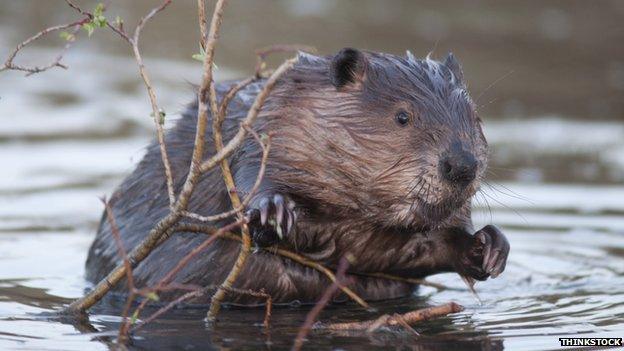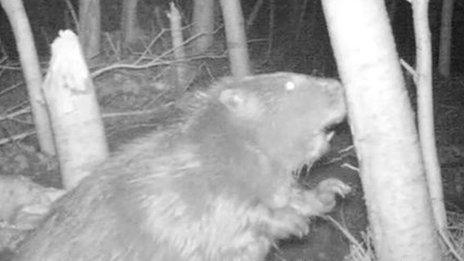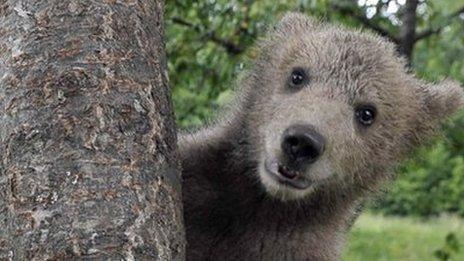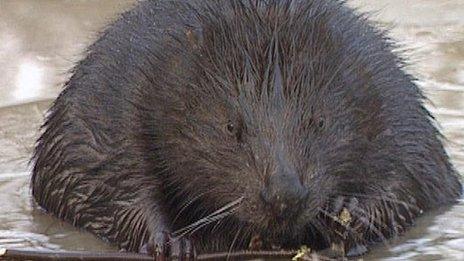Support claimed for Scottish beaver reintroduction plans
- Published
A trial to reintroduce beavers to Argyll ends soon but has it been a success and do the public think it is a good idea?
Most Scots support the reintroduction of beavers to the country, according to the findings of an opinion poll.
A five-year trial reintroduction of the species at Knapdale in Argyll is due to end next month.
It will then be up to the Scottish government to decide if beavers should have a future in Scotland. An announcement is due next year.
The YouGov poll, commissioned for the Scottish Beaver Trial, suggests 60% of Scots back the reintroduction of beavers - 5% were opposed.
Support was higher, at 74%, amongst those already aware of the issue.
Eurasian beavers taken from Norway were released at Knapdale in 2009.

A poll indicated that a clear majority of Scots want the beaver to return
Since then they've been the subject of a scientific study to evaluate their positive and negative impact on biodiversity, forestry, the landscape and the risk of flooding.
The Scottish Beaver Trial is a partnership led by the Scottish Wildlife Trust and the Royal Zoological Society of Scotland. It is hosted at Knapdale by Forestry Commission Scotland.
The trial is the first formal reintroduction of a mammal ever to take place in the UK.
Controlled release
Project manager of the Scottish Beaver Trial, Simon Jones, said: "It is really positive to see majority support for the reintroduction of beavers to Scotland.
"Feedback from several business owners in the Argyll area has also been positive and suggests the trial has boosted visitor numbers.
"Monitoring the social and economic benefits of beavers to the local area was always one of the trial's major aims. We hope that any benefits will be lasting."
Meanwhile, beavers have been breeding in the catchment of the River Tay. It is not known if Tay beavers escaped or were deliberately released.
Farmers and landowners have expressed concern about the impact the species can have on rural businesses.
Bob Carruth of NFU Scotland, said: "As the Knapdale trial reaches the end of its five-year programme, we await with interest the results of this very controlled release within an area of native woodland and wetland in Argyll.
"Of more immediate concern is the unscheduled and uncontrolled release of beavers on Tayside and the significant impacts on agricultural land that have been observed.
"We recently facilitated a meeting between some of those in NFUS involved in the Argyll trial and members from Tayside to discuss beaver reintroduction.
"We have been urging any of our members on Tayside affected by the beaver population there to respond to the ongoing survey and record any impact that the animals may be having.
"That will feed into the Scottish government's decision-making process around the possible future reintroduction of the species."
Further trials
Drew McFarlane-Slack, Highland regional manager for Scottish Land and Estates, said the Knapdale trial had produced some benefits for tourism in the area - but that beaver numbers had not seen the hoped-for expansion.
"The experience of other EU countries suggests that the introduction of beaver would provide an additional unwarranted threat to our forestry, fishing and farming businesses," he said.
He said that if ministers were planning to support an introduction, further trials should take place in more intensive farming and forestry areas before any decisions were made.
And he argued that the Scottish government would also need to create a compensation scheme for land managers.
It will be the environment minister, Paul Wheelhouse, who will make a final decision on the future of beavers in Scotland, based on advice from Scottish Natural Heritage.
'Important opportunity'
Mr Wheelhouse told BBC Scotland News: "I have to keep an open mind at this stage because I haven't yet seen the evidence to be presented to me by SNH.
"But clearly, this is a species which was present in Scotland for many, many years before it was eradicated by man.
"We have an important opportunity to evaluate what the impact would be of reintroducing a species that has had a history in this country.
"But although it may not be a completely new species to Scotland, we do have to understand what its impacts are."
The animals studied in the Scottish Beaver Trial are to remain in place until Mr Wheelhouse decides on their future.
Visitors to Knapdale will continue to be offered guided walks through the spring and summer to give them an opportunity to see the animals and learn more about them.
YouGov polled 1,652 Scottish adults between March 19 and 21. The survey was carried out online.
- Published27 February 2014

- Published20 April 2013

- Published27 March 2013
